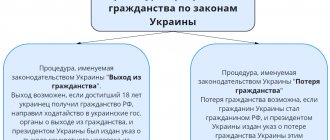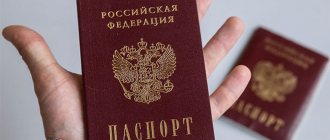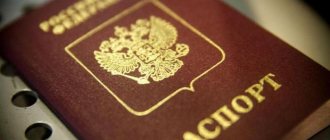Termination of Russian citizenship is possible for several reasons, the most common of which is the independent withdrawal of a citizen from his legal status. Renunciation of Russian citizenship is a common procedure that requires compliance with many formalities and conditions, without which the revocation of a passport is not permitted by law. Since this issue concerns thousands of Russians every year, we propose to dwell in more detail on the conditions, procedure and timing of independent renunciation of Russian citizenship.
Legislation
First of all, we draw the readers’ attention to international legislation. Thus, the main international document guaranteeing the right of a resident of any state to renounce the passport of his own country is Art. 12 of the International Covenant on Civil and Political Rights of the United Nations (hereinafter referred to as the UN Covenant).
The basis of Russian legislation regulating issues related to the acquisition and termination of citizenship is Federal Law No. 62-FZ of May 31, 2002 “On Citizenship of the Russian Federation” (hereinafter referred to as No. 62-FZ). In particular, Chapter III of this law defines the grounds for termination of status, the procedure for issuing and renouncing a Russian passport, circumstances preventing such a refusal, as well as other general rules for the procedure.
No less significant should be considered the Regulations approved by Decree of the President of the Russian Federation No. 1325 of November 14, 2002, regulating the procedure for considering issues of citizenship. In particular, Section III of the said Regulation clarifies the main points of a Russian citizen’s renunciation of citizenship: the procedure for completing the procedure, the procedure for filing an application, the necessary documents, and so on.
Reasons for leaving
Russian legislation does not define any closed and exhaustive list of reasons why Russians can refuse their passport. The issue of motivating reasons, by the way, is not regulated at the legislative level: Russian citizens are not at all obliged to voice the reasons why they want to renounce Russian citizenship and revoke the country’s passport.
However, when filing the appropriate application, they will still have to indicate the motives for such a step. In the context of this, we propose to consider the most common reasons for renunciation of citizenship:
- travel for permanent residence to other countries and the desire to obtain citizenship of third countries;
- obtaining a passport from another state in which bipatrism is prohibited and there is no international treaty with Russia;
- employment and naturalization outside the Russian Federation;
- marriage with a foreigner and the associated registration of a passport of another country;
- option or renunciation of citizenship due to the transfer of the territory of one country to another;
- an invitation to work as a highly qualified specialist and the associated receipt of a passport;
- internal conviction of one’s own statelessness (which, by the way, is contrary to the law, since a person cannot terminate Russian citizenship and remain stateless) or citizenship of another country, and so on.
Now let’s take a closer look at whether it is possible to renounce citizenship, in what cases this is possible and when the refusal will be allowed.
What is important to remember
Not all Russians who want to live abroad permanently have the desire to completely sever relations with their homeland. Many people still have relatives, real estate or businesses in this country.
For such “refuseniks,” the severance of relations with the Russian Federation is accompanied by certain difficulties.
If a person renounces Russian citizenship under a simplified scheme, then to enter the territory of the Russian Federation he will need to obtain a special visa. It is drawn up on a general basis.
The freedom of movement of the “refusenik” within the territory of the state will be somewhat limited. The acquisition of border real estate becomes impossible. This is explained by the fact that foreigners are strictly prohibited from entering into such transactions.
Conditions for renouncing Russian citizenship
According to Art. 19 No. 62-FZ, the main condition for the revocation of a Russian passport is the voluntary expression of the will of the person aimed at this. That is, no one can be forced or inclined to renounce citizenship - this is possible only by an exclusively voluntary decision of a Russian. However, despite all the voluntary nature of exit and the right to it, enshrined in Art. 12 of the UN Covenant, exit is permissive in nature: that is, in order to renounce a passport, it is necessary to obtain appropriate permission from the competent authorities. And, importantly, such permission may be refused.
The grounds for refusal to renounce Russian citizenship are defined in Art. 20 No. 62-FZ, according to which a citizen cannot leave it if:
- has an unfulfilled duty to the state (for example, tax arrears or military service);
- is brought to criminal responsibility by law enforcement agencies as an accused or has already been brought and in this regard there is an enforceable conviction;
- does not have a passport of another country or guarantees of receiving it.
The law does not provide for any other obstacles for which the competent authorities may refuse to cancel a passport. We note that if it turns out that the decision was made based on false information provided by the applicant, it is subject to immediate cancellation.
Conditions for minors
Due to the fact that the migration of Russian citizens is massive and family-based, Russian citizenship has to be renounced not only by adults, but also by minors. According to Art. 24 of the Federal Law “On Citizenship”, the citizenship of children is terminated simultaneously with the termination of the legal status of his parents (or one of them), unless the child remains stateless.
Since in legal relations with any subjects the interests of children are represented by parents, it is they who renounce citizenship for the child.
In cases where this happens simultaneously with the parents, the children do not even have to submit a separate application: all the necessary information is included in the applications for the parents.
If revocation of citizenship is required for a child whose only parent or at least one of them is already a foreigner, then a separate application will still be required. It is submitted jointly by the parents - the participation of a minor in this process is also excluded.
In what cases and who cannot renounce Russian citizenship?
First of all, it should be noted that the renunciation of Russian citizenship is of a permissive nature, and accordingly, in certain cases the application may be refused. The possibility of renouncing Russian citizenship is excluded in the following cases:
- If a citizen has an unfulfilled obligation to the Russian Federation established by federal legislation (for example, if a summons for conscription for military service has been received).
- If a citizen has been prosecuted and there is a court conviction against him that has entered into legal force and is subject to execution.
- If a citizen does not have citizenship of another country and guarantees for its acquisition.
- If a citizen has any property obligations to individuals or legal entities of the Russian Federation.
Important! Refusal to satisfy a petition to leave the Russian Federation must be justified in writing.
General exit procedure
The procedure for renouncing Russian citizenship, taking into account the norms of the Regulations approved by the decree of the President of the Russian Federation, is carried out in the following step-by-step order:
- Check to see if there are any grounds preventing renunciation of citizenship (criminal prosecution, unfulfilled obligations, whether there is a second citizenship).
- Prepare the application and necessary documents.
- Determine where to send the renunciation of citizenship: for those who are on the territory of the Russian Federation - the territorial unit of the Main Directorate for Migration Affairs of the Ministry of Internal Affairs at the place of residence;
- for those who are outside the Russian Federation - a diplomatic mission in a foreign country.
Package of necessary documents
The main document on renunciation of existing citizenship is, undoubtedly, a statement. It must comply with the form provided for in Appendix No. 4 to the Regulations, approved by Decree of the President of the Russian Federation No. 1325.
The statement reflects:
- request permission to leave;
- motives that prompted the exit;
- request for simultaneous renunciation of children's citizenship;
- personal details of the applicant (full name, gender, date of birth, nationality, etc.);
- data on professional activities;
- data on the presence of unfulfilled obligations, military service;
- presence of bipatrism;
- date and signature.
The application must be filled out by hand or on a computer. Abbreviations, dashes, and abbreviations are prohibited. Answers to questions asked must be comprehensive and handwriting legible. Below you can see an example of an application for renunciation of citizenship.
In this case, according to clause 3 of the Regulations, along with the application, the person will have to provide a package of documents, which includes:
- a document confirming the availability of a passport of another country or the possibility of obtaining one;
- military ID (for men of military age) with a mark on completion of military service or a mark on unsuitability for it;
- a certificate from the Federal Tax Service confirming the absence of tax debts;
- three photos measuring 3 x 4 cm;
- receipt for payment of state duty;
- passport of a Russian citizen.
The specified documents are submitted along with the application, and only if they meet the established requirements, the countdown of the period allocated for consideration of the application begins.
Failure Cases
Sometimes a person cannot exercise the right to renounce Russian citizenship. This is likely for the following reasons:
- errors in completing the required documentation package;
- charge of committing a criminal offense;
- tax debt;
- lack of citizenship of another country and the impossibility of providing it.
If there are no facts that prevent a positive decision, the person is issued a certificate of loss of citizenship of the Russian Federation. Internal and general foreign passports, military ID, and insert in the birth certificate are confiscated. The decision is made by a commission appointed by the President of Russia. For people living abroad, the verdict is given by representatives of the diplomatic consulate.
Simplified exit procedure
The general procedure for renouncing Russian citizenship was discussed above. It applies to all citizens of the Russian Federation who wish to renounce their passport, except:
- those who permanently reside outside the Russian Federation;
- minors renouncing citizenship separately from their parents, if at least one of the latter is a foreigner;
- those whose child or spouse has citizenship of another country.
A simplified refusal procedure is provided for such persons.
Each case has its own application form, its own package of additional documents, as well as other consideration periods. Thus, in the event of a simplified exit by citizens living outside of Russia, an application is submitted to the diplomatic mission of the Russian Federation in the form provided for in Appendix No. 5 to the Regulations. In addition to the above documents, it is also accompanied by documents confirming:
- the right to permanent residence in another country;
- deregistration at the place of residence in Russia.
If renunciation of citizenship is issued in relation to a minor, then his parents submit an application in the form provided for in Appendix No. 6 of the said Regulations. They add to it:
- the child’s birth certificate and, if available, a passport;
- documents confirming the child’s second citizenship or the possibility of obtaining it;
- three photos, size 3 x 4 cm;
- passport or other identification document of the parent;
- consent to renounce citizenship from a child if he is over 14 years old.
Some useful information for those who have decided to renounce Russian citizenship
There is a rule in Russian legislation: filing an application for a second citizenship and renouncing Russian citizenship at retirement age preserves the citizen’s right to social benefits in Russia. If the application was submitted before retirement age, the citizen loses the right to receive a Russian pension. If, after renouncing Russian citizenship, a citizen moves to another country for permanent residence, the right to issue a Russian pension can only be approved by the authorities of the country where he will reside. A person who decides to renounce Russian citizenship loses his residence permit; accordingly, in order to enter the territory of the Russian Federation, a citizen of another state must obtain an appropriate entry visa on a general basis. Persons with sources of income in Russia are tax residents, subject to personal income tax of 13%.
However, it is important to take into account the fact of the length of stay in Russia: less than 183 days over a continuous 12 months - the person is not a tax resident, which means that income received in Russia will be taxed in the form of personal income tax in the amount of 30%.
Non-residents cannot take advantage of the right to receive tax deductions. Refunds of overpaid taxes can only be made at the end of the calendar year through the tax authorities. Some exceptions are provided for citizens of Ukraine and Belarus.
Processing period and state duty
In addition to the package of documents and the application form, the main difference between the general procedure and the simplified one is the deadline for making specific decisions. So, according to Part 2 of Art. 35 of the Federal Law “On Citizenship”, a decision on issues of refusal of a passport in the general manner is made by the head of state within 12 months from the date of submission of the specified application and documents.
The period for consideration under a simplified procedure has been reduced by half: according to Part 4 of Art. 35 No. 62-FZ, it is six months from the date of submission of documents.
Please note that before submitting a package of documents, citizens must pay a state fee. According to paragraphs. 25 clause 1 art. 333.28 of the Tax Code, the amount of state duty in 2021 is 3.5 thousand rubles. It should be taken into account that the fee is paid for each applicant separately, including for children. In case of refusal to pay the state fee, the application for renunciation of citizenship will not be considered.
Documentation
To confirm your readiness to renounce Russian citizenship, you must submit official documents to the authorized bodies:
- Russian identity card in original and copies.
- Passport, certificate or other proof of citizenship of another state. The documentation is translated into Russian and notarized, and a professional translator is hired. In the absence of a passport, a certificate or extract certified by the migration department of the country that is ready to provide guaranteed citizenship is provided. The certificate is also certified by a notary.
- Confirmation from the tax office that there are no debts on taxes and fees, and that all fines have been paid.
- Photo size 30x40 mm, passport size, 3 pieces.
- When changing a surname or other personal data, evidence is required confirming the fact of entering new information - a registry office certificate, a court decision, etc.
Application form
When applying under the simplified procedure you will need:
- Certificate of deregistration at the place of residence, if such a mark is not contained in the passport.
- Consent of another state in writing to reside on its territory or issue a residence permit.
Expert opinion
All documents are submitted in original form and duplicates. When filing abroad, copies are certified by the consular office, in Russia - by notary offices. The passport is submitted after approval of the exit to the Migration Department as part of the Main Internal Affairs Directorate of the Ministry of Internal Affairs of the Russian Federation.
Shapovalov R.N., lawyer
Restoration of citizenship
The consequences of renouncing citizenship are expressed in the loss of any legal ties between the citizen and the state. However, according to Art. 15 of the Federal Law “On Citizenship”, such ties can be restored: all foreigners and stateless persons who were previously holders of a Russian passport have the right to restore their status in the general manner. To do this, they need to go through the procedure for acquiring citizenship in a general or simplified manner, depending on the specific circumstances taking place at the moment.
For those who restore citizenship in the general manner, the mandatory period of residence in the country is reduced from five to three years. However, the legislator does not rule out reducing this period to one year in exceptional cases.
And then the notary sent me to a psychiatrist
One of the most common problems is achieving a pension. A typical document for a refusenik is a USSR passport from 1974. Although it was mandatory to change them until 2004, no one canceled the legal force of these documents or strengthened them - they have a controversial legal status, but in fact they are useless, besides, passport offices refused to re-stick photographs based on age (25, 45 years old) .
Radicals with USSR passports are pathetic opportunists compared to those who simply burn all their numbered documents. Many people only have in their hands for the court the notarized “Certificate of Identity of a citizen with the person depicted in the photograph” (Article 84 of the Fundamentals of Notary Legislation) - after all, on its form there is only a coat of arms, without any sixes,
. Notaries often send these clients to a psychiatrist for a certificate.
During a personal conversation, the acting notary was unable to determine whether V.S. Safonov was able to understand the meaning of your actions and be guided by them, and a notarial act should be performed by a notary only in the absence of such doubts
from materials of judicial practice










